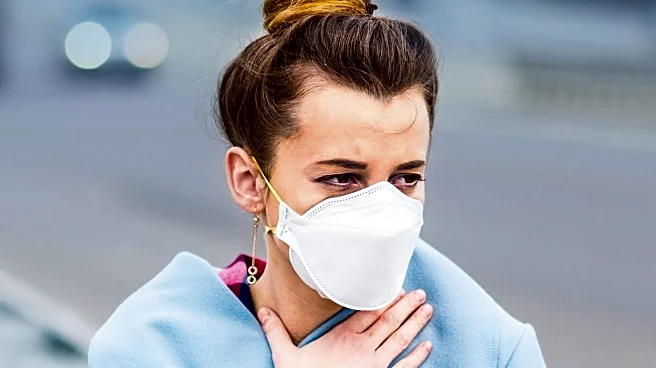What's Happening?
A recent study conducted in Changchun City, China, has identified a positive correlation between air pollution and meteorological factors with the number of outpatient visits for allergic rhinitis (AR).
The research analyzed data from 2018 to 2020, finding that pollutants such as PM 2.5, PM 10, NO 2, and SO 2 are linked to increased AR visits. Additionally, extreme weather conditions, including low and high temperatures, low relative humidity (RH), and low barometric pressure, were found to exacerbate AR symptoms, particularly in children. The study highlights the complex interplay between environmental factors and AR, suggesting that air pollution aggravates inflammation and oxidative stress, which may impair the immune system.
Why It's Important?
The findings underscore the significant impact of environmental factors on public health, particularly in urban areas. As air pollution and climate change continue to pose challenges globally, understanding their effects on conditions like allergic rhinitis is crucial for developing effective public health strategies. The study suggests that stronger environmental policies and health interventions could mitigate the incidence of AR, reducing the public health burden. It also emphasizes the need for healthcare professionals to consider environmental factors in patient care, especially for vulnerable groups like children, who are more sensitive to these conditions.
What's Next?
The study calls for further research into the mechanisms by which air pollution and meteorological factors influence allergic rhinitis, particularly in children. It also suggests the need for comprehensive environmental policies to address air pollution and climate change. Healthcare providers are encouraged to educate patients on the risks associated with environmental changes and to develop targeted protective measures. Additionally, the study highlights the importance of monitoring pollen levels, which could further inform the relationship between environmental factors and AR.
Beyond the Headlines
The study reveals deeper implications for public health policy, emphasizing the need for a holistic approach to environmental health. It suggests that addressing air pollution and climate change could have broader benefits for respiratory health, potentially reducing healthcare costs and improving quality of life. The research also highlights the ethical responsibility of governments and industries to mitigate environmental risks and protect vulnerable populations.









